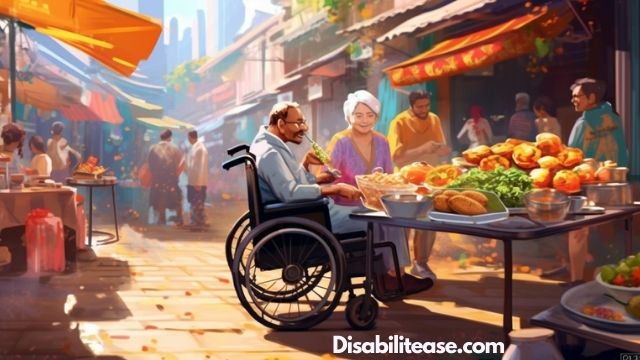Traveling can be an amazing experience for anyone, and it’s even more exciting when you get to sample the local cuisine. But what if you’re disabled or elderly? Is it still possible to enjoy the local delicacies while traveling?

Absolutely! With a few simple steps, disabled and elderly people can safely explore different cuisines on their travels.
Table of Contents
Tips On How To Enjoy Local Cuisine While Travelling As A Disabled Or Elderly People
In this article, we’ll look at how to research local cuisine, plan ahead for accommodations, and travel with a companion.
So let’s get started!
Research Local Cuisine
You can research local cuisine to make sure that disabled and elderly people can enjoy it while traveling! One way to do this is by exploring restaurants in the area. Check out online reviews of each restaurant to see what other customers have said about their experience. This will help give you an idea of the kind of food served, as well as any special accommodations they may offer for disabled and elderly people.
Another way to research local cuisine is by asking locals about their favorite dishes or places to eat. This will help you get a better understanding of the culture, as well as find restaurants that cater specifically to disabled and elderly people. Additionally, many tourist boards offer information on local eateries that are suitable for those with disabilities or who are elderly.
Once you’ve done your research, it’s important to plan ahead when travelling with disabled or elderly people. Make sure there is ample time for them to rest between activities and meals, so they don’t become too tired from sightseeing or having a full day out. Look into transportation options such as wheelchair-accessible buses or taxis before leaving home, so you know exactly how you’ll get around during your trip.
You should also call ahead at restaurants if necessary, so they can accommodate any special needs your group may have. When planning an enjoyable meal abroad for disabled and elderly people, remember that it’s important to be flexible in terms of what type of food is being eaten and where it’s being eaten at. Be aware of dietary restrictions if any exist in your group, and look into potential allergies beforehand too!
With careful research and planning ahead, anyone can have a delicious meal abroad no matter their age or ability level!
Plan Ahead for Accommodations

When planning a trip for an elderly or disabled person, it’s important to consider dietary restrictions and look for accessible restaurants.
Additionally, you should also research what types of adaptive equipment may be available in the area to make the experience more comfortable.
Doing this ahead of time will help ensure that everyone can enjoy their trip and all the delicious local cuisine!
Consider Dietary Restrictions
Considering dietary restrictions is essential when traveling, as they can prevent one from enjoying local cuisine. If you’re disabled or elderly, it’s important to plan ahead.
Here are some tips to help you out:
- Eating out – Research restaurants that offer a variety of dietary substitutes such as gluten-free, dairy-free, vegetarian/vegan options, etc. in advance to avoid any last-minute surprises during your trip.
- Speak with locals – Ask locals where they recommend eating for those with specific dietary needs and preferences. Locals are usually well-informed on the best places to go for different types of food and can even help find hidden gems that may not be accessible online or through tourist guides.
- Look up reviews – Read reviews online before deciding on a restaurant to make sure it’s able to accommodate your dietary restrictions and still provide an enjoyable experience overall.
It’s also important to remember that many countries have very different cuisines than what’s available in the United States. So, be sure to research local dishes before embarking on your travels. This way, you’ll know what ingredients may contain potential allergens or triggers for special diets.
Taking the time before travel and doing some extra research can ensure that everyone will be able to enjoy all of the delicious foods offered by their destination!
Look for Accessible Restaurants
Finding a restaurant that suits your dietary restrictions and is also accessible can be challenging, so it’s important to plan ahead before you go. One way of doing this is by researching restaurants in the area ahead of time and looking for ones that have assistive technology or meal modifications available.
Most restaurants will have an online menu with detailed descriptions as well as photos of each dish, which can help you decide if the food is suitable for your dietary needs. Additionally, many restaurants now offer wheelchair access and other forms of assistance to make dining more comfortable for elderly or disabled patrons.
Calling ahead to inquire about these services can help ensure that you have a pleasant dining experience while traveling.
Look for Adaptive Equipment
Adaptive equipment can make traveling more accessible and enjoyable for those with disabilities or age-related impairments. There are many options available to help disabled and elderly travelers enjoy local cuisine.
From adaptive shopping bags that attach to wheelchairs, to utensils designed specifically for tremors or arthritis, here are three ways adaptive equipment can enhance a traveler’s experience:
- Specialized cutlery that adapts to the user’s grip;
- Adaptive dining trays that attach directly to wheelchairs;
- Portable assistive devices like reachers allow even those who have difficulty using their hands the ability to pick up items off of plates or tables easily.
Adaptive equipment offers disabled and elderly people the opportunity to continue enjoying local cuisine while traveling without compromising safety or comfort. With these tools, they can stay independent and enjoy exploring new cultures—including food—without having to rely on others for assistance.
Travel with a Companion

Traveling with a companion can make it easier for disabled and elderly people to enjoy local cuisine while traveling, as they can rely on their companions for assistance.
It’s important to establish ground rules and etiquette for the trip before departure. This can include pre-trip communication about responsibilities, expenses, food preferences and allergies, and other details related to the travel experience. Establishing an understanding of these details ahead of time will help create a more pleasant journey where everyone is comfortable and aware of their roles.
When traveling with a companion, it’s important to be respectful of one another’s needs. Being mindful of personal space and accommodating dietary restrictions are just two ways in which travelers can show respect toward each other during their trip.
Taking turns planning meals or researching restaurants that offer cuisine suitable for everyone in the group is another way to ensure everyone has an enjoyable dining experience while traveling together. Additionally, being open-minded when trying new dishes can help broaden taste buds and create new experiences together as a team.
It’s also important to take into consideration any physical limitations or disabilities that may affect someone while eating out, such as difficulty walking or using utensils. In this case, having a companion present is especially beneficial as they can provide extra assistance along the way if needed.
Taking some time prior to departure to plan activities that accommodate any physical limitations will ensure all travelers have equal access throughout the duration of their trip!
Conclusion
You can definitely enjoy local cuisine while traveling, regardless of your age or ability level. With a little bit of research and planning, you can make sure that the restaurants you choose are accessible and accommodating for all.
And if needed, bring along a companion to help make navigating the area easier. Don’t let anything stop you from experiencing the best that each destination has to offer!
So, get out there and explore the world’s delicious cuisines!

Hi, my name is Eddie, I am a professional trainer specializing in the elderly population and I’m also a website designer. I love training in the gym, going to the beach, traveling, and having good food.
I combined my love for sport and website designing to make “DisabilitEase” whose purpose is to help elderly and disabled people live a more full and active life, have more fun, and enjoy their unique journey despite any disability.



